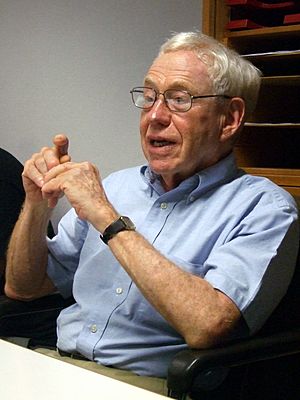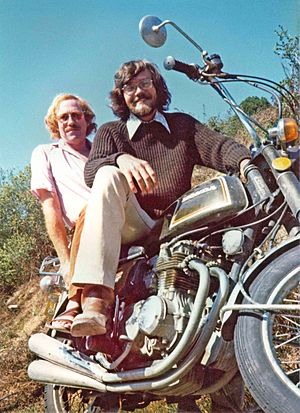Hubert Dreyfus facts for kids
Quick facts for kids
Hubert Dreyfus
|
|
|---|---|

Dreyfus in 2011
|
|
| Born |
Hubert Lederer Dreyfus
October 15, 1929 Terre Haute, Indiana, US
|
| Died | April 22, 2017 (aged 87) Berkeley, California, US
|
| Alma mater | Harvard University |
| Spouse(s) | Geneviève Boissier-Dreyfus |
| School |
|
| Institutions | |
| Thesis | Husserl's Phenomenology of Perception (1964) |
| Doctoral students |
|
| Other notable students | Eric Kaplan |
|
Main interests
|
|
|
Notable ideas
|
|
|
Influences
|
|
|
Influenced
|
|
Hubert Lederer Dreyfus (born October 15, 1929 – died April 22, 2017) was an American philosopher. He was a professor at the University of California, Berkeley. He was very interested in phenomenology and existentialism. He also studied the philosophy of psychology, literature, and especially artificial intelligence (AI).
Dreyfus was well-known for explaining the ideas of another philosopher, Martin Heidegger. Some people even called his work "Dreydegger." He appeared in the film Being in the World (2010). He was also interviewed for the BBC Television series The Great Philosophers (1987).
The character Professor Hubert Farnsworth from the TV show Futurama is partly named after him. This is because the show's writer, Eric Kaplan, was one of Dreyfus's former students.
Contents
Life and Career
Hubert Dreyfus was born on October 15, 1929. His hometown was Terre Haute, Indiana. His parents were Stanley S. and Irene (Lederer) Dreyfus.
Education and Early Work
He went to Harvard University starting in 1947. He earned his first degree, a Bachelor of Arts (BA), in 1951. He also got a Master of Arts (MA) degree in 1952.
From 1953 to 1954, Dreyfus studied in Germany at the University of Freiburg. During this time, he met the famous philosopher Martin Heidegger. However, Dreyfus found the meeting "disappointing."
Between 1956 and 1957, Dreyfus did research in Belgium. He studied at the Husserl Archives at the University of Louvain. His first paper was published around this time.
He taught philosophy at Brandeis University from 1957 to 1959. Then, he studied in Paris, France, from 1959 to 1960.
Teaching at MIT
In 1960, Dreyfus began teaching philosophy at the Massachusetts Institute of Technology (MIT). He started as an instructor and later became a full professor.
In 1964, he earned his PhD from Harvard with a paper on Husserl's Phenomenology of Perception. That same year, he helped translate a book by the philosopher Maurice Merleau-Ponty.
Also in 1964, while at MIT, he worked as a consultant for the RAND Corporation. He reviewed the work of researchers in artificial intelligence (AI). This led to his famous paper in 1965, Alchemy and Artificial Intelligence. It was the first of many writings where he challenged the claims of AI.
His book What Computers Can't Do came out in 1972. This book, which criticized AI, made Dreyfus well-known. It has been translated into many languages.
Moving to Berkeley
In 1968, Dreyfus left MIT and became a professor at the University of California, Berkeley. He won an award for excellent teaching that same year. In 1972, he became a full professor.
Dreyfus retired in 1994, but he kept teaching philosophy at UC Berkeley. He taught his last class in December 2016.
In 2001, he became a member of the American Academy of Arts and Sciences. He also received an honorary doctorate degree for his work on AI and his interpretations of philosophy.
Hubert Dreyfus passed away on April 22, 2017. His younger brother, Stuart Dreyfus, is also a professor at the University of California, Berkeley.
Dreyfus's Criticism of AI
Hubert Dreyfus was famous for his strong criticism of artificial intelligence (AI). He believed that AI research was based on some wrong ideas.
AI's Assumptions
Dreyfus pointed out four main assumptions that AI researchers often made:
- Biological Assumption: This idea says that the human brain is like computer hardware. It also says the mind is like computer software.
- Psychological Assumption: This idea suggests that the mind works by following clear, step-by-step rules (algorithms). It believes the mind processes information using separate pieces of data or symbols.
Dreyfus argued that these two ideas led to two more assumptions:
- Epistemological Assumption: This idea states that all actions, whether by people or objects, can be described using mathematical rules or laws.
- Ontological Assumption: This idea claims that reality is made up of many separate, independent facts.
Based on these assumptions, AI researchers believed that thinking is just about moving symbols around using rules. They thought human behavior could be understood without considering the situation or "context." This meant they believed a truly scientific psychology could find the "internal" rules of the human mind. They thought this would be like how physics finds the "external" laws of the physical world.
Dreyfus's Counter-Argument
Dreyfus disagreed strongly with this main idea. He argued that we cannot understand human behavior in the same way we understand objects in physics or chemistry. We cannot predict human actions using "objective," context-free scientific laws. According to Dreyfus, a psychology that ignores context simply doesn't make sense.
Dreyfus used ideas from phenomenology and hermeneutics (especially from Martin Heidegger). Heidegger believed that our way of being in the world is deeply connected to our situation or "context." Because of this, Dreyfus argued that the two context-free assumptions of AI are false.
Dreyfus said that we can choose to see human actions as following rules. We can also choose to see reality as separate facts. But just because we can see things this way doesn't mean it's an objective truth. Dreyfus believed it's often not true. Therefore, any AI research based on these wrong assumptions would face big problems and likely fail.
Dreyfus argued that for a machine to have human-like intelligence, it would need to experience the world like a human. It would need a body similar to ours. It would also need to grow up in a society like ours. Other researchers in embodied psychology and distributed cognition share similar views.
Daniel Crevier, a writer on AI, noted that Dreyfus's comments were often accurate and insightful. He suggested that if Dreyfus had presented his ideas less aggressively, some helpful changes might have happened sooner in the AI field.
Webcasting Philosophy
Around 2006, UC Berkeley and Apple started making some lecture classes available online as podcasts. One of Dreyfus's courses, "Man, God, and Society in Western Literature," became very popular. It was one of the most listened-to webcasts on iTunes. These online lectures helped many people, even those not in college, learn about Dreyfus and his ideas.
Works
Books
- 1972. What Computers Can't Do: The Limits of Artificial Intelligence. (Later re-titled What Computers Still Can't Do)
- 1983. (with Paul Rabinow) Michel Foucault: Beyond Structuralism and Hermeneutics.
- 1986 (with Stuart Dreyfus). Mind Over Machine: The Power of Human Intuition and Expertise in the Era of the Computer.
- 1991. Being-in-the-World: A Commentary on Heidegger's Being and Time, Division I.
- 1997. Disclosing New Worlds: Entrepreneurship, Democratic Action, and the Cultivation of Solidarity (co-author)
- 2001. On the Internet.
- 2011. (with Sean Dorrance Kelly) All Things Shining: Reading the Western Classics to Find Meaning in a Secular Age.
- 2014. Skillful Coping: Essays on the Phenomenology of Everyday Perception and Action.
- 2015. (with Charles Taylor) Retrieving Realism.
Select Articles
- 1965. Alchemy and Artificial Intelligence.
See also
 In Spanish: Hubert Dreyfus para niños
In Spanish: Hubert Dreyfus para niños
- Critique of technology
 | John T. Biggers |
 | Thomas Blackshear |
 | Mark Bradford |
 | Beverly Buchanan |


